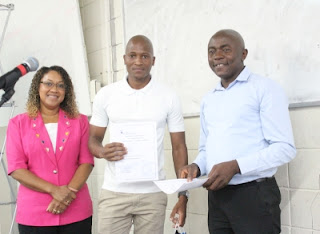Prof Jensen shares his disgust for poor results and the expectations of poor result holders
 |
| Prof Jensen |
I have in front of me the 2010 "Statement of Results" for the National Senior Certificate statement of a youngster who demands to study at university. They are: Afrikaans 43, English 39, mathematical literacy 38, life orientation 78, business studies 41, computer applications technology 31, and life sciences 28. At the bottom of the certificate is this unbelievable statement: "The candidate qualifies for the national senior certificate and fulfils the minimum requirements for admission to higher education."
Understandably, this young woman takes these words literally, and correctly demands a seat in any place of higher learning. With the young woman's claim to study I have no problem. With the society that sets the bar for performance so low, I have serious problems.
Slowly, slowly we are digging our collective graves as we fall into a sinkhole of mediocrity from which we are unlikely to emerge.
We make excellence sound like a white thing. Behind a massive wave of populism, and in the misguided name of regstelling (setting right the past), we open access to resources and universities to young people without the hard work necessary to achieve those gifts and to succeed once there. Of course, you're a racist if you question this kind of mindlessness; how else do you, as a politician, defend yourself against the critics of mediocrity in an election year?
I miss Steve Biko. In the thinking of black consciousness, he would have railed against the low standards we set for black achievement, in the language of the 1970s.
This young (incidentally black) person did not achieve anything above 50% in her Senior Certificate results for any exam subject, but we tell her she can proceed to higher studies. What are we saying? That black students are somehow less capable and therefore need these pathetic results to access higher education? No, I am sorry, but today I am angry about the messages we send our children.
I saw black parents and students squirm the other night when I addressed a racially diverse group of parents and students and made this point clear: "If a black student requires from you different treatment and lower academic demands because of an argument about disadvantage, tell them to take a hike." (Okay, I used stronger language.)
I saw white teachers squirm when I made the other important point: "If you have lower academic expectations of black children because of what they look like, or where they come from, that is the worst kind of racism."
Our society, schools and universities have adjusted expectations downwards, especially in relation to black students, and that is dangerous in a country with so much promise for excellence.
As stories come rolling in from across the country for our Great South African Teachers book, I am struck by one thing. That many black professionals who are chartered accountants, medical scientists or corporate lawyers tell of attending ordinary public schools under apartheid, often in rural areas, and having teachers at the time who, despite the desperate poverty and inequality, held high expectations of their learners. There was no compromising on academic standards; there was homework every day; there was punishment for low performance; and there was constant motivation to rise above your circumstances.
Not today. Mathematical literacy is a cop-out, a way of compensating for poor maths teaching in the mainstream. Parents of Grade 9 children listen carefully - do not let your school force your child into mathematical literacy because they will struggle to find access to academic degree studies at serious universities. Insist your child does mathematics in Grade 10 for that important choice determines what your child writes in Grade 12.
It is not, of course, mathematical literacy that I am concerned about; there are good teachers of the subject. It is about the message we send: that children can't do maths. In other words, a message again communicated of low expectations. Do not buy into this culture of mediocrity in the way your child makes subject choices. Also, tell your child not to take life orientation seriously; as you can see in the above results, there is no positive relationship between high marks in academic subjects and this thing called life orientation.
Small wonder young people with better results than those above are without work. The marketplaces, and serious universities, know this child will not succeed with these kinds of results, even if Umalusi does not "get it".
(This material was received as an email attachment from Mr Terence Hermanus)
eish! what do you think about Prof Jensen's piece?



Prof Jensen is right they is need for us students to put effort in our learning to attain more than the minimum required standards. Our education should be of great value so that we can compare our level of standards to the rest of the world, of which they no way we can be better when we are always bringing our standards ourselves. We are creating qualifications that cannot be qualified by the rest of the world.
ReplyDeletewell said. i genuinely think that if we are not careful, future generation of South Africans will not enjoy contemporary competitiveness. And i bet you, Prof Jensen is not the only one who has experienced this. many staff members were approached by matrics who brandished very poor results. these folks wanted an opportunity to study here at CPUT. our conscience played the full on some of us. should we provide this opportunity or should we ask these guys to go give matric a second chance? and what if we provide them with a space at CPUT, can they cope? or will they battle to survive university work? we (and i mean everyone of us - students and staff) really should worry about this.
ReplyDeleteSuch is the unfortunate reality in South Africa. But then again, where do you draw the line?
ReplyDeletewhat line if i may ask Fatts? while i wait for your response, perhaps it makes good sense to interrogate this a bit differently. let's say teachers are not doing a good job of getting learners to pass radiantly, should we then compensate those who couldn't make good results with a space in the university?
ReplyDeleteThanks to Pro Jensen for such a wonderful piece of work. This is a serious issue which also affects me at this University (CPUT). I wonder why those involved in decision making agree to set low standards, however in the above case by Pro Jensen (Matric Standards) is even worse. A student with such grades – an average of about 35% in all her subject (excluding life orientation) will definitely find it difficult to cope at University level. Students with such performance can only cope well in Universities such as ours “CPUT” which has also extended the aspect of lowering the performance standards. I am saying this from experience as all the school work I did for my first year (last year) was way down below the University level. To me it was more or less Grade 7 staff on a certain examining board; however this all proved to me that the standards set are too low.
ReplyDeleteTo my sister above seeking entry to University level I would advise her to wait for a while as we negotiate with Matric board to give her a second chance if it does not offer a second chance to her. If she continues to University level after being promised by the Matric board to proceed, she will be struggling and she might end up thinking that she has taken a wrong route by enrolling at University. To her parents, given a chance to give a word of advice, I would advise then to strongly consider the resources they have to use for their daughter. Allowing her to seek for a University place is a serious issue as they are bound to lose their hard earned income. Still, their daughter has to proceed to University but how? This should be a headache to her parents. The only option I suggest to her parents is a second chance to be examined by Matric board so that better results can be achieved.
To Mr Chuks Gervase: personally I can say CPUT can give such students a space BUT a consideration of the programmes in which they can be enrolled should be put first. They should not be given space if they want to join through the Faculty of Applied Science, Engineering and some demanding programmes not mentioned. They can be taken in the Faculty of business in programmes such as Entrepreneurship as I best know the whole of first year work and other easy programmes which can be best known by the CPUT staff. The Faculty of Engineering and the Faculty of Applied Science cannot be an option to my sister above as she cannot proceed to her second year and her life can be so stressed as these fields are a bit more challenging.
However, it is not always good to tolerate such standards as it negatively paints Universities which enrols such students. Its performance standards become compromised. Some institutions have a heart to help students by promising them to proceed to a next level despite the hardships which can be encountered by the students (Matric board). In some universities, the entry standards are extremely high that they can only take students who have achieved an average mark of about 50% in all subjects and this mark is not easy to attain because the standards will be way above second year work here at CPUT (Entrepreneurship).
Dear Lucky, you do sound like you have fire in your stomach. Pretty much worrying is your insinuation that the dept of entrepreneurship lacks reasonable high standards and the faculty of business is a dumping ground for the not-so serious students. Strong words I must say.I wonder how many people feel the way you do.
ReplyDeleteThis comment has been removed by the author.
ReplyDeletewhat Prof says is the truth about South Africa, but my concern is who should play a role in eradicating such mediocratic low standards in education if the government allows it. And how will the young generation better or further educate themselves if such low marks are not accepted at tertiary level?
ReplyDeleteWhat Prof says is true because of our education system as it derives from politicaly motivated gluttonous, that is the reasons why we have such toxic mix of education.Let us not criticize as we are adding to the problem but give advice on what needs to be done, especilly as Proffessors.
ReplyDelete